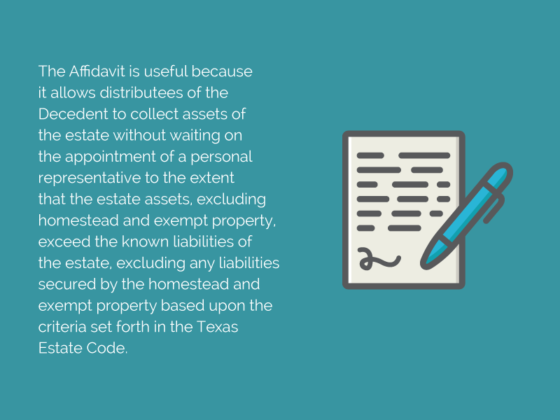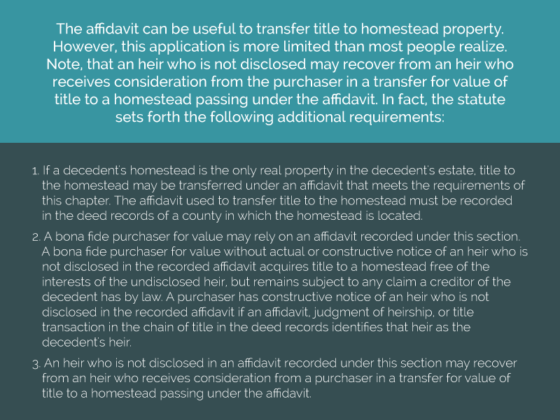The Texas Small Estate Affidavit

The Texas Small Estate Affidavit is a useful tool to settle estates in Texas. However, its use is often misunderstood and the affidavits are frequently rejected by courts because they fail to comply with the statutory requirements of Texas Estates Code Section 205.
Thus, it is advised to always use a licensed Texas Estate Planning and Probate Attorney to assist with the preparation and filing of the Affidavit. Note, the amount of estate assets has recently been increased from $50,000 to $75,000 in Texas. This post will set forth some basic information regarding the Affidavit and its use.
How Can an Affidavit Help?
The Affidavit is useful because it allows distributees of the Decedent to collect assets of the estate without waiting on the appointment of a personal representative to the extent that the estate assets, excluding homestead and exempt property, exceed the known liabilities of the estate, excluding any liabilities secured by the homestead and exempt property based upon the criteria set forth in the Texas Estate Code.
Under this procedure, an Executor (Personal Representative) is not appointed and Letters Testamentary are not issued. If someone is requesting Letters Testamentary this probably is not the procedure for you.

Texas Small Estate Affidavit Criteria
The requirement for entitlement to an estate without the appointment of a personal representative is found in Texas Estates Code Section 205.001. The requirements are listed below:
- 30 days have elapsed since the date of the decedent’s death;
- no petition for the appointment of a personal representative is pending or has been granted;
- the value of the estate assets on the date of the affidavit described by Subdivision (4), excluding homestead and exempt property, does not exceed $75,000;
- an affidavit that meets the requirements of Texas Estates Code Section 205.002 is filed with the clerk of the court that has jurisdiction and venue of the estate;
- the judge approves the affidavit as provided by Texas Estates Code Section 205.003; and
- the distributees comply with Texas Estates Code Section 205.004.
Texas Small Estate Affidavit Requirements
 Section 205 also sets forth the requirements that each affidavit must meet to be approved by the Court. Yes, the Affidavit has to be filed with a court, the Court will examine it and it will be approved only if it meets the statutory requirements. The requirements of the affidavit are set forth in Texas Estates Code Section 205.002 as follows:
Section 205 also sets forth the requirements that each affidavit must meet to be approved by the Court. Yes, the Affidavit has to be filed with a court, the Court will examine it and it will be approved only if it meets the statutory requirements. The requirements of the affidavit are set forth in Texas Estates Code Section 205.002 as follows:
An affidavit filed under Texas Estates Code Section 205.001 must:
- be sworn to by:
- (A) two disinterested witnesses;
- (B) each distributee of the estate who has legal capacity; and
- (C) if warranted by the facts, the natural guardian or next of kin of any minor distributee or the guardian of any other incapacitated distributee;
- show the existence of the conditions prescribed byTexas Estates Code Sections 205.001(1), (2), and (3); and include:
- a list of all known estate assets and liabilities;
- the name and address of each distributee; and
- the relevant family history facts concerning heirship that show each distributee’s right to receive estate money or other property or to have any evidence of money, property, or other right of the estate as is determined to exist transferred to the distributee as an heir or assignee.
- A list of all known estate assets under Subsection (a)(3)(A) must indicate which assets the applicant claims are exempt.
A Copy of the Texas Small Estate Affidavit Must Be Provided to Certain Individuals
Another requirement is that a copy of the affidavit must be provided to certain persons as set forth by statute.
 The distributees of the estate shall provide a copy of the affidavit under Texas Estates Code Chapter 205, certified by the court clerk, to each person who:
The distributees of the estate shall provide a copy of the affidavit under Texas Estates Code Chapter 205, certified by the court clerk, to each person who:
- owes money to the estate;
- has custody or possession of estate property; or
- acts as a registrar, fiduciary, or transfer agent of or for an evidence of interest, indebtedness, property, or other right belonging to the estate.
Title to Homestead Transferred Under Affidavit (In Limited Circumstances)
The affidavit can be useful to transfer title to homestead property. However, this application is more limited than most people realize. Note, that an heir who is not disclosed may recover from an heir who receives consideration from the purchaser in a transfer for value of title to a homestead passing under the affidavit. In fact, the statute sets forth the following additional requirements:
- If a decedent’s homestead is the only real property in the decedent’s estate, title to the homestead may be transferred under an affidavit that meets the requirements of this chapter. The affidavit used to transfer title to the homestead must be recorded in the deed records of a county in which the homestead is located.
- A bona fide purchaser for value may rely on an affidavit recorded under this section. A bona fide purchaser for value without actual or constructive notice of an heir who is not disclosed in the recorded affidavit acquires title to a homestead free of the interests of the undisclosed heir but remains subject to any claim a creditor of the decedent has by law. A purchaser has constructive notice of an heir who is not disclosed in the recorded affidavit if an affidavit, judgment of heirship, or title transaction in the chain of title in the deed records identifies that heir as the decedent’s heir.
- An heir who is not disclosed in an affidavit recorded under this section may recover from an heir who receives consideration from a purchaser in a transfer of value of title to a homestead passing under the affidavit.

Liability Associated with Texas Small Estate Affidavit
There is liability associated with the use of a Small Estate Affidavit. If you think you are going to use this procedure to deprive someone who has a prior right to property by the use of this procedure you are sorely mistaken. The statute provides the following:
- A person making a payment, delivery, transfer, or issuance under an affidavit described by this chapter is released to the same extent as if made to a personal representative of the decedent. The person may not be required to:
- see to the application of the affidavit, or
- inquire into the truth of any statement in the affidavit.
- The distributees to whom payment, delivery, transfer, or issuance is made are:
- answerable for the payment, delivery, transfer, or issuance to any person having a prior right; and
- accountable to any personal representative appointed after the payment, delivery, transfer, or issuance.
- Each person who executed the affidavit is liable for any damage or loss to any person that arises from a payment, delivery, transfer, or issuance made in reliance on the affidavit.
- If a person to whom the affidavit is delivered refuses to pay, deliver, transfer, or issue property as provided by this section, the property may be recovered in an action brought for that purpose by or on behalf of the distributees entitled to the property on proof of the facts required to be stated in the affidavit.
Practical Considerations for the Texas Small Estate Affidavit

When considering the preparation and filing of a Texas Small Estate Affidavit, the statute is not the only consideration. Note, the end result is to get the Court to approve the Affidavit. Therefore, you need to consider your audience, i.e., the Judge. The following are some practical considerations:
- The Affidavit must characterize the Decedent’s property as either separate or community;
- The Affidavit must list the assets and liabilities of the estate;
- The Affidavit must state facts sufficient to allow the Court to determine who would be the heirs at law;
- The Affidavit must include dates of birth and dates of all marriages and their disposition;
- The Affidavit must be signed by all distributes. A natural guardian (parent) may sign for a minor. A court-appointed guardian may sign for an incapacitated person. At times, a court may require that an Attorney Ad Litem be appointed for a minor person prior to the approval of the Affidavit;
- The Affidavit must be signed by two disinterested witnesses;
- The Affidavit will not be approved by the Court if the Decedent dies with a Will;
- The value of the Decedent’s residence must be included in the calculation of the estate’s value, even if it was protected from creditors as a homestead during the decedent’s lifetime unless the Decedent is survived by a spouse or minor children;
- The procedure is limited to asset collection purposes and will not clear title to real property other than a homestead. Further, a court will not approve a small estate affidavit that lists real property other than a homestead of the decedent that is also homestead in the hands of the heirs pursuant to Texas Estates Code Section 205.009;
- The procedure is not a quick as you would think and the Affidavit has to be filed with the court, examined by the Judge and ultimately approved or rejected;
- An Executor (Personal Representative) will not be appointed; and
- Letters Testamentary will not be issued.
 Conclusion
Conclusion
The above discussion illustrates that the Texas Small Estate Affidavit is not as simple as first appears. Therefore, you are well advised to seek the assistance of a Texas Probate Attorney to help with the preparation and filing of the Texas Small Estate Affidavit. For questions please contact The Wright Firm, LLP – Board Certified Texas Estate Planning and Probate Attorney Paul F. Wright at (214) 780-9696 or [email protected].

Leave a Reply
Want to join the discussion?Feel free to contribute!